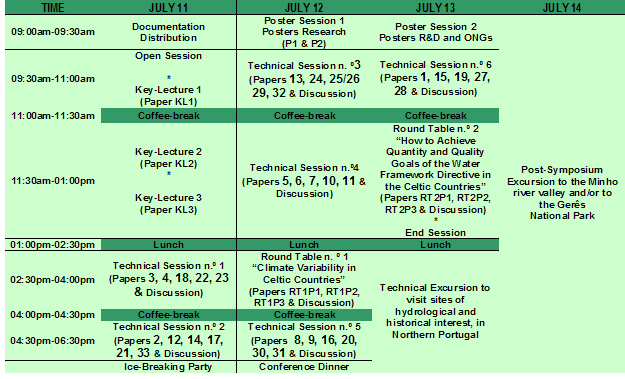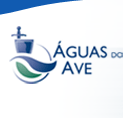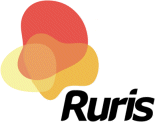 |
The Fourth Inter-Celtic Colloquium on Hydrology and Management of Water Resources |
Introduction
The International Association of Hydrological Sciences (IAHS), the Universidade do Minho (UM, Portugal), the Laboratório Nacional de Engenharia Civil (LNEC), the Associação Portuguesa dos Recursos Hídricos (APRH), the Associação Portuguesa para Estudos de Saneamento Básico (APESB) have the pleasure to welcome you to The Fourth Inter-Celtic Colloquium on Hydrology and Management of Water Resources, entitled WATER IN CELTIC COUNTRIES: Quantity, Quality and Climate Variability, held at UM, Guimarães, Portugal, July 11-14, 2005.
The Colloquium was organised under the aegis of the International Association of Hydrological Sciences.
The First Inter-Celtic Colloquiumon Hydrology and Management of Water Resources was organised in Rennes, Britanny, France, in July 1996 by the Centre d'Études du Machinisme Agricole du Génie Rural des Eaux et des Forets (CEMAGREF), Direction Regionale de l'Environnement (DIREN), Institut Français de Recherche pour l'Exploitation de la Mer (IFREMER), Institut National de la Recherche Agronomique (INRA), and the Institut National des Sciences Appliquées (INSA). Following the success of the First Colloquium, the Second Inter-Celtic Colloquium "Water in the Celtic World: Managing Resources for the 21 st Century”, was held in Aberystwyth, UK, during July 2000. It was organised by the University of Wales, under the aegis of IAHS and sponsored by the British Hydrological Society. The Third Inter-Celtic Colloquium “Celtic Water in European Framework – Pointing the Way to Quality” was held in Galway, Ireland, during July 2002, organised by the National University of Ireland at Galway, under the aegis of IAHS and supported by the Irish National Committees for IHP, IHHS and ICID, of the National IAHS Committee of the United Kingdom and France and of the British Hydrological Society. Among others the topics addressed were the following: Water quality: pressures and responses; Integrated river basin management; The scientific support for management; Risk assessment, perception and management.
The experience gathered in the previous Inter-Celtic Colloquiums was forwarded to the Fourth Inter-Celtic Colloquium, held in the Northern Portugal city of Guimarães, as the main organisers of previous Colloquiums were invited to join the Fourth Colloquium Organising Committee.
Papers were invited, among others, in the following fields:
Environmental change - climatic change, climatic cycles, land-use development, Global Climate Model, Regional Climate Models and hydrological models. Impact of climate changes to water quality and quantity (surface and groundwater). Uncertainty of climate change and its impacts on the water cycle.
Vulnerability and risk assessment - Surface runoff and groundwater recharge. Floods, droughts and risk management. Groundwater vulnerability, conservation and protection. Risk assessment, perception and management.
Integrated river basin management - Scientific support for management. Water Framework Directive and Groundwater Daughter Directive. Water quality: pressures, responses and aquatic ecosystems. Integrated urban water management under climate change constraints. Public water supply - resources and demand.
Social history of water use in Celtic lands. Paleoclimatic changes and adaptation strategies.
33 papers have been submitted to the Organising Committee for peer review by the Scientific Committee. All papers have been afterward accepted following the introduction of up-grading suggestions made by the reviewers.
Accepted papers have been scheduled for presentation in six Thematic Sessions:
T1 - Climate variability;
T2 - Water Quality;
T3 - Groundwater;
T4 - Hydrology;
T5 - Modelling;
T6 - Management & EIA.
The list of the 33 accepted papers is the following:
- Cycleau - Integrating research and decision-making for whole river basin management ( Loveday E.T. Jenkin, and Dave C. Watkins - UK).
- The eutrophication in the river Vouga basin – impacts on the quality of water for public supply ( FIGUEIREDO FAUSTO OLIVEIRA - Portugal).
- An assessment of runoff trends in the Celtic regions of North West Europe (J.HANNAFORD and T.J. MARSH, - UK).
- Precipitation trends in Mainland Portugal in the period 1941-2000 (M. ISABEL P. DE LIMA, ANA C.P. MARQUES, JOÃO L.M.P. DE LIMA, and M. FÁTIMA E.S. COELHO – Portugal).
- Applying MIKESHE to define the influence of rewetting on floods in Flanders (MARK HENRY RUBARENZYA, PATRICK WILLEMS, JEAN BERLAMONT, and JAN FEYEN – Belgium).
- Le littoral des Bas-Champs (Picardie, France) soumis aux risques perpétuels d’inondation (JULIA BASTIDE, EDWARD ANTHONY, FRANCK DOLIQUE – France).
- Mechanisms of flooding in the Mawddach catchment (GRAHAM HALL and ROGER CRATCHLEY - UK).
- The environmental impact and risks associated with changes in fluvial morphodynamic processes (J. S. ANTUNES DO CARMO - Portugal).
- Influencia de una plantación de eucaliptus globulus de siete años sobre los caudales de estiaje de una pequeña cuenca (B. SOTO, M.A. BREA, R. PEREZ, and F. DÍAZ-FIERROS– Spain).
- Isotopes et ressources en eau, exemple du bassin synclinal d’Essaouira (Maroc Occidental) (M.BAHIR, M.O. SILVA, J. MENDONÇA, P. CARREIRA, GALEGO FERNANDES, M. BENBIBA, and M. ELMERAJI - Maroc/ Portugal)
- Water balance and observed flows in the Anllóns river basin (NW Spain) (RIAL RIVAS, M.ERMITAS, ÁLVAREZ ENJO MANUEL ALÍ, and DÍAZ-FIERROS VIQUEIRA, FRANCISCO - Spain).
- Aluminum contents in drinking water from public water supplies of Galicia ( Northwest Spain) (DAVID A. RUBINOS, MANUEL ARIAS, CARLOS AYMERICH, and FRANCISCO DÍAZ-FIERROS- Spain).
- Hydrogeology of hard-rocks in the Portuguese Iberian Massif: Porto urban area and Serra da Estrela mountain region (Mª.JOSÉ AFONSO, J.E.MARQUES, J.M. MARQUES, P.CARREIRA, J.M. CARVALHO, M.MARQUES DA SILVA, JAVIER SAMPER, B. PISANI, F.S. BORGES, F.T. ROCHA, P. E. FONSECA, A.GOMES, MªA. ARAÚJO, G.TELES VIEIRA, CARLA MORA, JOSÉ TEIXEIRA, P.G. ALMEIDA, J. A. GONÇALVES, and H.I. CHAMINÉ - Portugal).
- An indicator system for surface water quality in river basins (RITA OLIVEIRA, and MANUELA LIMA – Portugal).
- Application of RIAM to the environmental impact aassessment of hydroelectric installations (PAULO S.F. DE ARAÚJO, EDUARDO F.S.C. MOURA, and NAIM HAIE - Portugal).
- Hydrological modelling and salt water intrusion in a Northern Portugal estuary (JOSÉ L. PINHO – Portugal).
- Origins and dynamics of suspended sediment in small agricultural catchments (J. LEFRANCOIS, C. GRIMALDI, C. GASCUEL-ODOUX, and N. GILLIET – France).
- Implications of climate change for river regimes in Wales: a comparison of scenarios and models (J.A.A. JONES – UK).
- Marnage et biodiversite en etang peu profond: estimation et relations (Limousin, France) (DELPHINE BRUNAUD – France).
- Constructions cyanobactériennes calcaires dans les rivières de Haute-Normandie: perspectives de gestion (FREDERIC PITOIS, ALAIN JIGOREL, and PAUL FERLIN – France).
- Stockage du phosphore dans les sédiments d’un réservoir eutrophe (Gouet, Bretagne, France) (ALAIN JIGOREL, ANNICK BOUEDO, and REMY NICOLAS – France).
- On the impact of changes in the weather on the surface temperature of Windermere (UK) and Lough Feeagh (Ireland) (GLEN GEORGE, DIANE HEWITT, ELEANOR JENNINGS, NORMAN ALLOTT, and PHILIP MCGINNITY - UK/Ireland).
- Models to predict the impact of the climate changes on aquifer recharge (MANUEL MENDES OLIVEIRA, MARIA EMÍLIA NOVO, and J. P. LOBO-FERREIRA - Portugal).
- On Wellhead protection assessment methods and a case-study application on Montemor–o-Novo, Portugal (MARIA JOÃO MOINANTE and J. P. LOBO-FERREIRA – Portugal).
- Assessing aquifer vulnerability to sea-water intrusion using GALDIT method: Part 1 – Application to the Portuguese Aquifer of Monte Gordo (J. P. LOBO-FERREIRA, A. G. CHACHADI, and CATARINA DIAMANTINO, M. J. - Portugal/India).
- Assessing aquifer vulnerability to sea-water intrusion using GALDIT method: Part 2 – GALDIT Indicators Description (A. G. CHACHADI and J. P. LOBO-FERREIRA - India/Portugal).
- Impact of road runoff in soil and groundwater. Synthesis of Portuguese and other European case-studies (TERESA E. LEITÃO - Portugal).
- Methodologies for pollution risk assessment of water resources systems (CATARINA DIAMANTINO, M. J. HENRIQUES, MANUEL M. OLIVEIRA, and J.P. LOBO-FERREIRA - Portugal).
- New method for groundwater plume detection under uncertainty (LUÍS MIGUEL NUNES, MARIA DA CONCEIÇÃO CUNHA, LUÍS RIBEIRO, and JOÃO AZEVEDO - Portugal).
- Application of artificial neural networks for river flow simulation and forecasting on three French catchments (M. GOSWAMI, and K.M. O’CONNOR– Ireland).
- Hydrologic models and Geographic Information Systems for water resources evaluation: Application of GIS-BALAN to Atlantic basins in Spain and Portugal (JAVIER SAMPER, MIGUEL ANGEL GARCÍA VERA, BRUNO PISANI, ALBERTO VARELA, JOSÉ ANGEL LOSADA, DIEGO ALVARES, and JORGE ESPINHA MARQUES - Spain / Portugal).
- The use of multivariate statistical analysis to evaluate spatial and temporal water contamination in Germunde coal mine ( Portugal) (RENATA SANTOS, LUÍS RIBEIRO, AMÉLIA CARVALHO DILL – Portugal).
- Quality Assurance for Hydrometric Network Data as a Basis for Integrated River Basin Management (FRANK SCHLAEGER, and MICHAEL NATSCHKE – Germany).
The following three KEY-LECTURES have been programmed:
- Key-Lecture on “Echanges intersystèmes: du bassin versant aux eaux côtières littorale”, by JEAN CLAUDE LEFEUVRE Professeur au Muséum d'Histoire Naturelle de Paris, Président de l'Institut Français de la Biodiversité (France).
- Key-Lecture on “Hydroinformatics Support to Flood Forecasting and Flood Management”, by ADRI VERWEY, Delft Hydraulics (The Netherlands).
- Key-Lecture on “Flooding and climate change”, by ALAN WERRITTY, Prof. at Dundee University, Scotland ( UK).
Two Round Tables have been programmed, the first one on "Climate variability assessment and relevance" and the on "How to achieve quantity and quality goals of the Water Framework Directive".
- “Impacts of Climate Change on Water Resources: a Case-Study on Portugal”, by L. VEIGA DA CUNHA (Professor at Universidade Nova de Lisboa, Portugal – Co-authors of the paper: RODRIGO PROENÇA DE OLIVEIRA, JOÃO NASCIMENTO, and LUIS RIBEIRO).
- “Regional Climate Change Impact and Selected Response Studies in the UK, by IAN HOLMAN ( Cranfield University at Silsoe, UK).
- “On methodologies for the assessment of climate change impacts on groundwater resources”, by J. P. LOBO-FERREIRA, MARIA EMÍLIA NOVO, MANUEL MENDES OLIVEIRA, and CATARINA DIAMANTINO. (Laboratório Nacional de Engenharia Civil, Portugal).
- “Progresses in the implementation of the WFD in EU Member-States”, by A. G. HENRIQUES (LNEC, Portugal).
- “Potential implications of the WFD for catchments management in the UK” by ALUN ATTWOOD (Policy Advisor Wales for the Water Framework Directive, UK).
- “Water safety plans: methodologies for risk assessment and risk management in drinking water systems”, by JOSÉ VIEIRA (Universidade do Minho, Portugal).
The following events have been programmed:
A half-day technical excursion to visit sites of hydrological and historical interest, in Northern Portugal (e.g. Citânia de Briteiros, see figure below) .
An ice-breaking party at Palácio dos Duques de Bragança, ( see figure below) .
A conference farewell dinner at Pousada de Santa Marinha, in Guimarães.
A one-day post-symposium excursion to the Gerês National Park (Suajo village and Alto Lima reservoir) and to the Minho river valley, including wine tasting at the Alvarinho Wine House on the banks of the Minho river ( see figure below).
 |
| Citânia de Briteiros, Minho - a ruined Celtic hill-top settlement, and river Minho at Monção |
 |
| Palácio dos Duques de Bragança, Castelo de Guimarães, Universidade do Minho at Guimarães |
J.P. Lobo-Ferreira (Chairman, LNEC, Portugal, lferreira@lnec.pt )
José Vieira (Co-Chairman, Universidade do Minho/President APESB, Portugal, jvieira@civil.uminho.pt )
Pierre Hubert (Co-Chairman, IAHS, Ecole Nationale Supérieure des Mines de Paris, France, hubert@cig.ensmp.fr )
Alain Jigorel (I Inter-Celtic, INSA, Brittany, France, Alain.Jigorel@insa-rennes.fr )
J.A.A. Jones (II Inter-Celtic, University of Wales, UK, jaj@aber.ac.uk)
Con Cunnane (III Inter-Celtic, National University of Ireland Galway, Ireland, conleth.cunnane@nuigalway.ie)
José Luís da Silva Pinho (Universidade do Minho, Portugal, jpinho@civil.uminho.pt )
Teresa Leitão (President APRH, LNEC, Portugal tleitao@lnec.pt )
Javier Samper (Universidade da Coruña, Galicia, España, samper@iccp.udc.es )
John C. Rodda ( Chair, IAHS)
Francisco Nunes Correia (Instituto Superior Técnico, Portugal)
Rafaela Matos (LNEC, APESB, Portugal)
Maria A. Santos (LNEC, Portugal)
Luís Veiga da Cunha (Universidade Nova de Lisboa, Portugal)
José Novais Barbosa (Universidade do Porto, Portugal)
Maria da Conceição Cunha (Universidade de Coimbra, Portugal)
Adri Verwey (Delft Hydraulics, The Netherlands)
J. Dooge (University College Dublin, Ireland)
J. McCulloch (European Geophysical Society-HESS)
Z.W. Kundzewicz (Editor HSJ, Polish Academy of Sciences)
P. Mérot (INRA, Rennes, Britanny, France)
A. Werritty ( University of Dundee, Scotland, UK).
 |
ASSOCIAÇÃO PORTUGUESA DOS RECURSOS HÍDRICOS |
International Association of Hydrological Siences Association internationale des sciences hydrologiques |
Associação Portuguesa para Estudos de Saneamento Básico |

Lisbon (LNEC) and Guimarães (Universidade do Minho), June 2005, JP Lobo Ferreira and José Vieira










